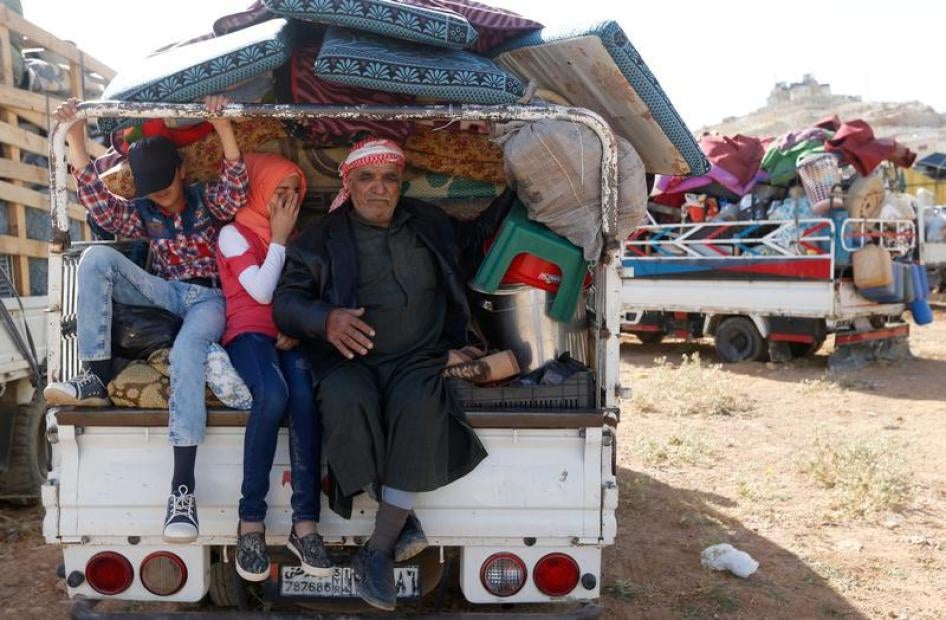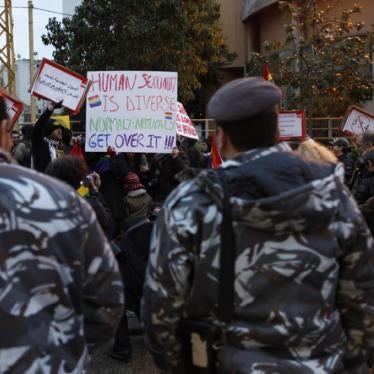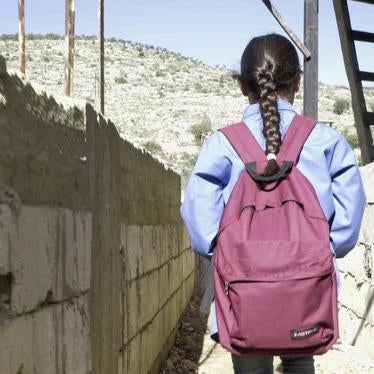In the past month, Lebanon has seen a number of troubling developments regarding the presence of Syrian refugees, with leading politicians heightening calls for the return of refugees to Syria and making unfounded accusations of an international conspiracy to settle them in Lebanon.
As countries around the world have turned their backs on refugees, Lebanon is hosting an estimated 1.5 million Syrians, by far the highest number of refugees per capita in the world. At the Friends of Syria donor conference in Brussels in April, Lebanon made important commitments to refugee rights, including on residency status, education, legal protection, and nonrefoulement—the prohibition on returning people to places where they are in danger. These could have a real and positive impact on the lives of Syrians in Lebanon—if they are carried out. But since then, things have taken a turn for the worse.
Following Brussels, Lebanon’s president, speaker of parliament, and foreign minister slammed a joint EU-UN statement that mentioned a “choice to stay,” saying that it suggested permanent settlement in Lebanon. But that phrase only related to people displaced within Syria, not to refugees in Lebanon.
Just after Lebanon recommitted in Brussels to not forcibly returning refugees, politicians turned up the volume for their return. Although not calling outright for forced returns, President Michel Aoun said he would seek a refugee “solution” without the UN. He also called on the United Arab Emirates, Saudi Arabia, and Egypt to help facilitate refugee returns. And the Foreign Ministry summoned the UN refugee agency’s country representative and accused the agency of scaremongering after UNHCR put out a neutral statement saying it was not involved in the return of 500 refugees to Syria in April.
Most recently the caretaker Foreign Minister Gebran Bassil gave UNHCR two weeks to develop a strategy for refugee returns and alleged that it is trying to discourage returns to Syria. He then froze residency permits for UNHCR staff in Lebanon—without the government’s backing — accusing it of hindering the return of Syrian refugees by “spreading fear.”
Bassil claims that by interviewing Syrians prior to their return, UNHCR is scaring them from going back. But these interviews are part of UNHCR’s core mandate to protect the rights of refugees and ensure they are informed of the conditions in Syria so they can make an informed choice about whether to return at this time. UNHCR cannot “encourage” or facilitate returns of refugees before it has assessed that conditions in Syria are safe.
The attacks on UNHCR are a troubling escalation of pressure on refugees. Since the beginning of the crisis, Lebanon has generally respected the international prohibition on refoulement, and has—with some exceptions— not forcibly returned refugees to Syria. But while there is no evidence that recent returns of Syrians have been forced, Human Rights Watch found that returns from Arsal last year were not voluntary, but were the result of harsh living conditions, largely as a result of Lebanese policies that have restricted legal residency, work, and freedom of movement.
Refugees who want to return to Syria voluntarily are free to do so. But under international law, Lebanon cannot force or coerce refugees or asylum seekers who have a well-founded fear of persecution in Syria to return. Lebanese politicians have claimed that areas in Syria are “safe,” but this ignores the volatile nature of the Syrian conflict, in which more than 900,000 people have been displaced within Syria in the first four months of 2018 alone.
And aside from generalized conflict, many refugees fear arrest, torture, and forced conscription if they return. These fears are well founded. Human Rights Watch has for years documented widespread patterns of arbitrary detention, torture, and deaths in Syrian government custody. If Lebanese politicians are so eager for refugees to return, they should stop using UNHCR as a scapegoat and focus their efforts to addressing the real barriers to return, including Syria’s unlawful detention practices and the government’s use of urban planning laws to seize private property without due process or compensation.
Lebanese politicians have justified these calls for return by claiming that Syrians are hurting Lebanon’s economy—arguments made largely without evidence. The presence of Syrians has certainly put a strain on services including waste management, electricity, and education, but these services have also been bolstered with international aid in response to the crisis. And while the war in Syria has certainly taken a toll on Lebanon’s economy, there is little concrete evidence that the presence of refugees has done the same. Meanwhile, refugees contribute to Lebanon’s economy, paying for rent, phone bills, and shopping in Lebanese stores—aside from the billions of dollars in humanitarian aid to Lebanon.
But despite aid to Lebanon, the international community’s striking failure to resettle meaningful numbers of refugees has contributed to the crisis in Lebanon. Syrian refugee admissions to the US have dropped almost to zero. The European Union is still hiding behind the EU-Turkey deal to keep refugees out of Europe.
There is an urgent need for a fact-based discussion around the issue of refugees in Lebanon. The government should keep the commitments it made in Brussels and end attacks on the international community and baseless speculation about an international plan to settle refugees in Lebanon. And the international community should step up both humanitarian aid and resettlement of refugees to demonstrate that Lebanon has not been abandoned to bear this burden on its own.










